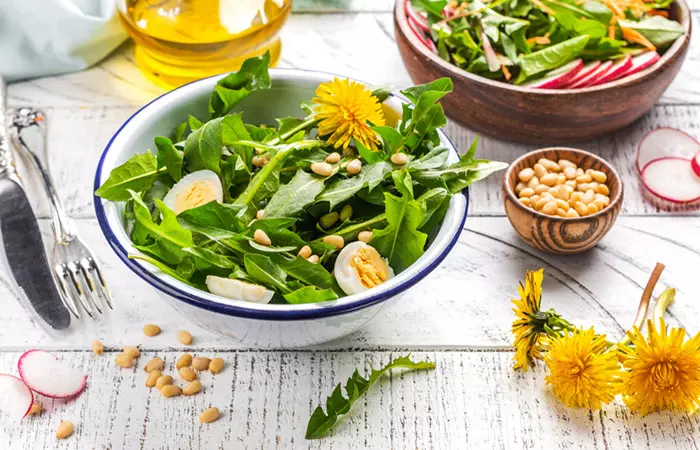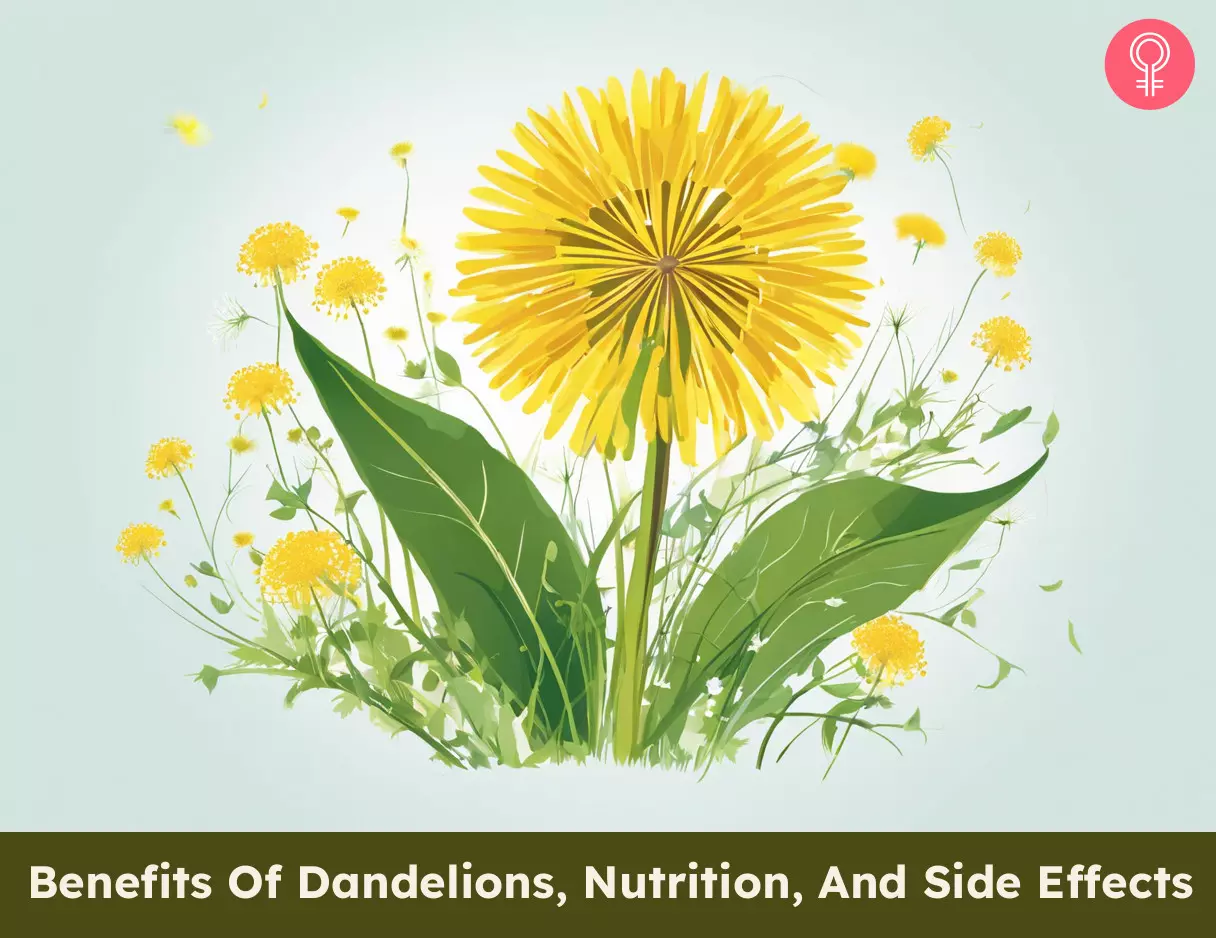In addition, these flowers may also cut down the risk of cancer and combat inflammation. However, quality research is warranted in this aspect. These flowers are scientifically known as Taraxacum officinale, and their potential benefits are gaining attention fast. Learn more about the health benefits of dandelions. Read on.
What Are The Potential Health Benefits Of Dandelions?
The bioactive compounds in dandelions may help fight inflammation and even cancer. They may also help lower blood sugar levels. While their calcium and vitamin K content can strengthen bones, their iron content may help prevent anemia. What Are Its Benefits? Dandelions may help treat diabetes, promote heart health and weight loss, improve liver health, prevent anemia and reduce the risk of cancer, strengthen bones, fight inflammation, and boost skin health. Who Can Use It? Anyone except individuals who are on blood-thinning medications or have kidney issues. How Often? You can consume it daily as part of your diet or as a dietary supplement. The ideal dosage of powdered dandelion root is 3-4 grams 3 times a day. Caution Consume dandelions in moderation to avoid allergies, drug interactions, risks, and side effects like contact dermatitis and renal failure. Consult your doctor to know the right dosage for you, and seek medical advice if you experience adverse effects.
1. May Help Fight Inflammation
Cells treated with dandelion compounds were found to have lower levels of inflammation. The polysaccharidesi Large molecules of carbohydrates that form the structural basis of plant cells and provide energy for animals. from dandelions possess anti-inflammatory and anti-oxidative properties that play a promising role in this regard (2). Dandelion works by reducing the production of pro-inflammatory cytokines, which are compounds usually involved in the body’s inflammation (3). In another study involving mice with lung inflammation, the introduction of dandelion (Taraxacum mongolicum, grown in China) was found to improve the condition (4).
2. May Cut Cancer Risk
Studies done on dandelion root (and lemongrass extracts) found that it had anti-cancer potential. The root was found to induce apoptosis (cancer cell death) and enhance the effects of chemotherapy. This study was conducted on prostate cancer cells (5). Dandelion root extract could be a non-toxic and effective anti-cancer alternative. It was able to trigger programmed cell death of cancer cells in colorectal cancer models. The molecular complexity (a particular parameter involved in drug discovery) of the root extract could be responsible for this anti-cancer activity (6). Dandelion root extract was also found to prevent cancer of the liver (7). Similar effects were observed in pancreatic cancer as well (8). Though these findings are encouraging, more research is needed to understand and establish how dandelions may prevent and treat cancer in humans.
3. May Aid Diabetes Treatment
The chicoric and chlorogenic acids in dandelion possess great potential as anti-diabetic nutraceuticals and pharmaceuticals for regulating diabetes. The acids contain phenolic compounds that may promote the flower’s anti-diabetic effects (1). In a study, both dandelion leaves and the roots were found to have similar therapeutic effects on individuals with diabetes. These could promote the long-term health and well-being of the patients (9). However, the long-term effect of dandelion consumption needs to be investigated. Other bioactive compounds in dandelions that offer anti-diabetic benefits include phenols, flavonoidsi Plant-derived molecules that may potentially benefit our health by stimulating cell signals and neutralizing free radicals. , phenolic acidsi A group of naturally occurring plant compounds that possess antioxidant and anti-inflammatory abilities. , and triterpenesi Active compounds known to have anti-inflammatory, antiviral, and antimicrobial properties used to treat immune-related disorders. . The root of dandelion contains inulin, which contains complex carbohydrates. These help normalize blood sugar levels (1).
4. May Promote Heart Health
Mice treated with dandelion extracts showed a dramatic decrease in the levels of triglyceridesi A type of fat that stores unused calories in the body and converts them to release energy when needed. and cholesterol. When mice were fed a high-fat diet supplemented with the extract, there was reduced hepatic lipid accumulationi Accumulation of organic compounds insoluble in water in the liver, leading to fatty liver and causing metabolic dysfunction. observed (10). Similar findings were observed in a rabbit study. In rabbits that were fed a high-fat diet, the introduction of dandelion root improved the antioxidant status and lowered serum cholesterol levels. The root combats oxidative stress as well and may promote heart health (11). Dandelion may also promote heart health by lowering blood pressure levels. The plant contains potassium (12). Studies show that regular dietary potassium can help lower blood pressure levels (13).
5. May Help In Weight Loss
Dandelion was found to have effects similar to a popular weight loss drug (Orlistat), which works by inhibiting pancreatic lipase. Pancreatic lipase is an enzyme released during digestion that assists in fat breakdown. Inhibiting this enzyme can alter the way fat is absorbed in the body, possibly aiding weight loss (14). However, further studies are required to elucidate the anti-obesity effects of dandelion in humans. Dandelion is a bitter herb. Studies show that bitter herbs, when taken as teas prior to eating, can stimulate gastric secretions and promote cholesterol and fat breakdown. This way, they may complement your weight loss efforts (15).
6. May Promote Bone Health
Dandelion greens are good sources of vitamin K and calcium (12). Both these nutrients are associated with bone disorders like arthritis. Vitamin K is known to increase the formation of bone. It also can regulate calcium balance and bone metabolism. In addition to increasing bone mineral density, vitamin K also reduces fracture rates (16). Calcium intake also influences bone health in a positive way. It plays an important role in preventing bone loss and fractures (17). The compounds in dandelion contain prebiotics, which were found to enhance calcium absorption. This way, they may also play a role in bone health improvement (18).
7. May Improve Liver Health
Dandelion root may promote liver health in multiple ways. In a study, it could alleviate high-fat diet-induced non-alcoholic fatty liver disease and also reduce alcohol-induced oxidative stress (19). Some research also suggests that dandelion can promote recovery from liver injury (20).
8. May Boost Immunity
The flavonoid contents of dandelion may have a major impact on the human immune system. It contains short-chain fatty acids, which were found to boost immune function and prevent infectious diseases in weaned pigs (21). Dandelion also may nourish the blood cells in the body. Mice studies show it can help achieve normal red blood cells and white blood cells balance. This way, it may boost the immune system (22).
9. May Prevent Anemia
There is less information available in this aspect. Some research states that dandelion can help prevent anemia as it contains iron (23). One cup of chopped dandelion (55 g) contains about 2 mg of iron (12).
10. May Prevent Water Retention In Kidneys
The diuretic properties of dandelion can help here. Its high potassium content makes dandelion a good diuretic (24). In a study, intake of dandelion increased the urinary frequency in subjects over a period of 5 hours (25). Hence, this plant shows promise as a diuretic in humans and may help prevent water retention in kidneys. However, if you have kidney disease, consult your doctor before using dandelion.
11. May Boost Skin Health
Studies show that dandelion extracts can protect the skin from UVB damage. They exhibited protective effects against photoaging (26). This makes dandelion a potential superfood for glowing skin, as it helps maintain a youthful appearance and protects against environmental stressors. In folk medicine, dandelion (especially the sap of the plant) was believed to be used to treat warts and eczema, among other skin disorders (27). Some evidence also states that the sap of dandelion may be used to combat acne (28). However, more research is warranted in this regard.
12. May Help Treat Gastrointestinal Disorders
Folk medicine has used dandelion for treating various gastrointestinal ailments such as dyspepsia, gastritis, and enteritis, among others. Recent research has shed light on the potential GI-protective properties of dandelion and its constituents. It contains key substances like taraxasterol, caffeic acid, luteolin, polysaccharides, and inulin that have demonstrated pharmacological effects against a spectrum of GI disorders, from gastroesophageal reflux disease to ulcerative colitis (29). Dandelion’s anti-inflammatory and anti-oxidative actions suggest its potential as a complementary and alternative medicine for GI-related conditions (29). While dandelion presents promise, more clinical studies are needed to better understand its applications in gastrointestinal health. These are the ways dandelions can make your life better. Though we know a few of the nutrients present in this plant, well, there is a lot more. In the following section, we will take a detailed look at dandelion’s nutrition profile.
What Is The Nutritional Profile* Of Dandelions?
*values sourced from USDA, dandelion greens, raw That’s an impressive nutritional profile, isn’t it? Including dandelions in your diet is quite easy. Up next, we will discuss a few simple ways to do just that.
How To Consume Dandelions
The simplest way to consume dandelions is to include them in a salad. Just toss a few dandelion greens into your evening vegetable salad. Sauteéd dandelions are another good option. Cooking dandelions removes their bitterness. You can boil the greens for about 5 minutes and then transfer them to a pan with garlic and hot olive oil. Sauté for 3 to 5 minutes. Eat as it is. You can also use dandelion flower petals in your preparations. You can add the petals to your bakery items like muffins, cookies, or even plain bread.
The most popular way of enjoying the goodness of dandelion is in the form of tea. But how do you make it?
How To Make Dandelion Tea
The process is simple.
What Is The Ideal Dosage Of Dandelions?
The American Botanical Council recommends the following doses (30):
For the powdered root, the dosage is 3 to 4 grams, thrice daily. If you are taking a decoction, boil 3 to 4 grams of powdered root in 150 ml of water. In case of an infusion, you can steep 1 tablespoon of cut root in 150 ml of water. If you are having a tincture, stick to 10 to 15 drops, thrice daily.
If you are taking a dandelion supplement, you can follow the dosage prescribed by your healthcare provider. Dandelion has been given the generally recognized as safe (GRAS) status and approved by the US FDA for use as a supplement (31). Before you start making dandelion a regular part of your diet, you need to be aware of its side effects.
Do Dandelions Have Any Side Effects?
May Cause Allergies
Dandelions may cause allergic contact dermatitisi An inflammation of the skin which is not contagious but can cause an itchy rash due to contact with an allergen or irritant. . This can be attributed to the presence of compounds called sesquiterpene lactones, which are irritants. The symptoms of this allergy include dry and itchy eczema-like reactions (32). Anecdotal evidence suggests that dandelion pollens may also trigger asthma.
May Interfere With Blood Thinners
Dandelion is rich in vitamin K, which aids blood clotting. Dandelion may interfere with blood thinners like Warfarin (33).
May Cause Kidney Failure In Susceptible Individuals
There is less research on this. However, a herbal remedy containing dandelion as one of the primary ingredients caused renal failure (34). If you have kidney issues, please avoid dandelions until you check with your doctor. There is no information on the safety of dandelions during pregnancy and breastfeeding. Hence, consult your doctor in this regard. Does dandelion tea contain caffeine? Check out the infographic to know how to use dandelion for the skin efficiently.Illustration: StyleCraze Design Team No, it doesn’t. But there is dandelion coffee, which is a coffee-like blend with the effects of caffeine. Does dandelion make you sleepy? No, dandelion is not known to be a sleep-inducing food. Anecdotal evidence suggests that taking it at night may even cause anxiety and restlessness. How does dandelion help detoxify your body? Dandelion can help detox your body with its hepatoprotective properties. These help the liver cleanse your body of common toxins (35). Is it safe to eat dandelions from your yard? Yes, it is safe to eat dandelions from your yard. Ensure that you avoid consuming dandelions from a yard that has been sprayed with pesticides. Is dandelion good for hormones? Yes, dandelions help regulate the enzyme aromatase which aids in the growth and development of follicles and improves ovarian function (36). Can dandelion be mixed with ginger? Yes, you can dandelion with ginger to create a nourishing and delicious latte or smoothie.
Illustration: Benefits Of Dandelions Nutrition And Side Effects
Check this video out for more details on the health benefits of dandelion. From aiding digestion to boosting immunity, learn how this wild plant can help you stay healthy.












